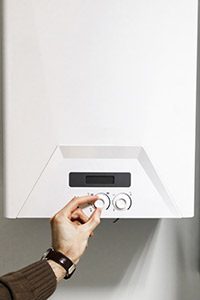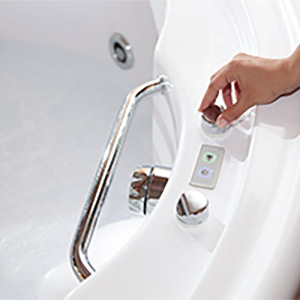Choosing a Tankless Water Heater Can Save You Time and Money – Here’s How.
Should you choose a traditional water heater or a tankless water heater, and why? Traditional water heaters store water in a large tank on the property while tankless water heaters heat water straight from the pipe and require no storage tank. While a lower initial cost often persuades people to choose a traditional water heater, they miss out on the great advantages of a tankless water heater. From saving money in the long run to less wait-time for hot water, a tankless water heater can provide you with many benefits that a traditional water heater can’t match.

Energy Efficient
If you have a traditional water heater, the machine heats up the entire 30-, 40-, or 50-gallon tank no matter how much water you were actually going to use. For example, if you only needed a few gallons of hot water to wash dishes, then your water heater would waste energy heating up the entire tank. In addition, you would have standby energy loss as well. When the rest of the water cooled down over time, it would waste the energy it used to heat it up in the beginning.
Tankless water heaters, on the other hand, don’t waste energy by heating up a large tank of water like traditional water heaters do. Tankless water heaters only heat up the amount of water you need at the time. The system doesn’t waste energy heating up excess water, which keeps your energy bill low.
Longer Lifespan
Tankless water heaters have a longer lifespan, plain and simple. While many skip a tankless water heater because of their higher initial cost, they can end up saving you a substantial amount of money over time. Lasting up to 10 years longer than a traditional water heater, these tankless counterparts prevent you from having to purchase another unit sooner. On top of saving you money monthly on energy bills, a tankless water heater is a better investment long term even with the initial higher cost.
Smaller for More Storage
A traditional water heater can take up the size of a single or double closet depending on the size of the tank. These bulky, unsightly units cost you valuable storage or living space as they’re placed somewhere inside for temperature control.
Tankless water heaters, however, save you a lot of space. Small and compact, these units are often small enough to fit in a cabinet. Many homeowners enjoy the additional storage space they get when they switch to a tankless water heater.
Instant Hot Water
If you hate waiting for the water to get hot, then you may want to choose a tankless water heater for this benefit alone. Unlike traditional water heaters where you have to wait up to 10 minutes to enjoy a hot shower, a tankless water heater provides instant hot water. They also never run out of hot water, so you never have to worry about a long, hot shower turning into a cold one.
Less Water Was te
te
Traditional water heaters burn through gallons of water before they heat the water up to the desired temperature. While you’re waiting for the shower to get hot, you’re wasting water and energy. Tankless water heaters remove this water and energy waste by providing you with hot water on demand. You’ll start saving on your water bill as well as your energy bill as you cut down on your waiting time for hot water.
Reduced Risk of Flooding
Traditional water heaters always come with the risk of leaking or flooding if the tank ruptures. If your unit is located inside, you could end up having severe water damage in your home. From your floors to your walls and furniture, a ruptured tank can ruin your home and cause mold growth.
Tankless water heaters remove this risk completely. As they don’t store water, there is no risk of water leaking from the unit and there is no risk of flooding. Tankless water heaters give you peace of mind by removing this risk to you and your home.
When it comes to water heaters, tankless water heaters provide the better benefits. If you have any question about the advantages of choosing a tankless water heater for your home, call the experts at Central Plumbing. We’ll be happy to help you choose the best option for your home.





